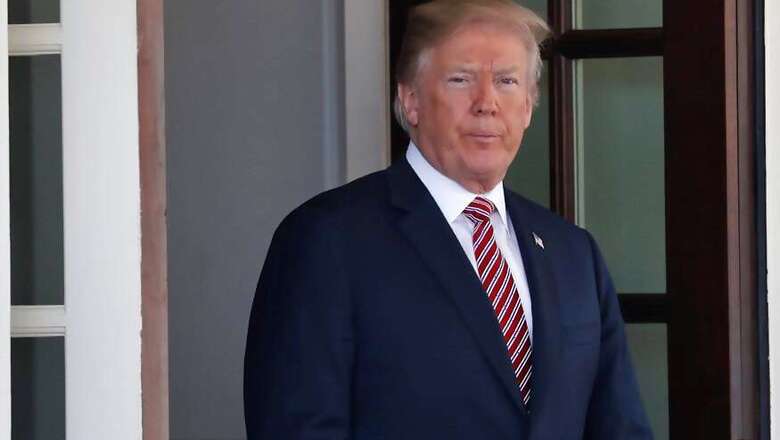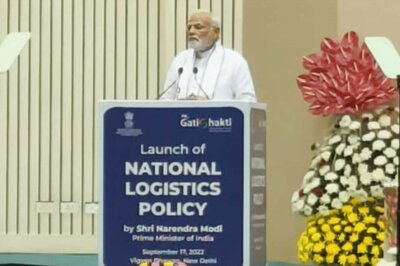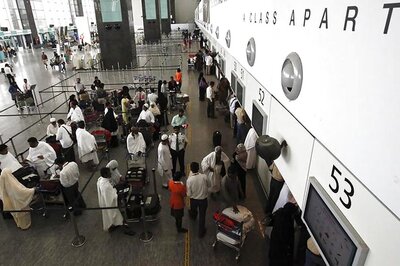
views
Washington/Beirut: US President Donald Trump warned Russia on Wednesday of imminent military action in Syria over a suspected poison gas attack, declaring that missiles "will be coming" and lambasting Moscow for standing by Syrian President Bashar Assad.
Trump was reacting to a warning from Assad's main ally Russia on Tuesday that any US missiles fired at Syria over the deadly assault on a rebel enclave would be shot down and the launch sites targeted.
"Russia vows to shoot down any and all missiles fired at Syria. Get ready Russia, because they will be coming, nice and new and 'smart!'," Trump wrote in a post on Twitter.
Russia vows to shoot down any and all missiles fired at Syria. Get ready Russia, because they will be coming, nice and new and “smart!” You shouldn’t be partners with a Gas Killing Animal who kills his people and enjoys it!— Donald J. Trump (@realDonaldTrump) April 11, 2018
"You shouldn't be partners with a Gas Killing Animal who kills his people and enjoys it!" Trump said, referring Moscow's alliance with Assad.
In response, Russia's Foreign Ministry said in a Facebook post that "smart missiles should fly towards terrorists, not towards the lawful government", referring to Syrian rebels and Assad respectively.
Foreign Ministry spokeswoman Maria Zakharova said any US missile strike could be an attempt to destroy evidence of the reported chemical weapons attack in the Syrian town of Douma, for which Damascus and Moscow have denied any responsibility.
After the attack, the rebel group holed up in Douma - Jaish al-Islam - finally agreed to withdraw from the town. That sealed a major victory for Assad in Syria's civil war, crushing a protracted rebellion in the eastern Ghouta region near Damascus.
Officials at the White House did not immediately respond to a Reuters request for more details about Trump's comments on the planned military action. The US Defense Department did not immediately respond to a request for comment.
The World Health Organization said on Wednesday that 43 people had died in Saturday's attack on Douma from "symptoms consistent with exposure to highly toxic chemicals", and more than 500 in all had been treated.
Moscow's threat to down US missiles came from its ambassador to Lebanon, Alexander Zasypkin, who said he was referring to a statement by President Vladimir Putin and the Russian armed forces chief of staff.
Zasypkin also said that any hostilities with Washington should be avoided and Moscow was ready for negotiations.
But his remarks could raise fears of direct conflict for the first time between major powers backing opposing sides in Syria's protracted civil war.
Oil prices hit their highest level in more than three years on Wednesday after Trump's threat to unleash missiles, and US stock index futures fell sharply over rising concern about possible Russian-US conflict over Syria.
The Kremlin said earlier on Wednesday it hoped all sides involved in Syria would avoid doing anything to destabilise an already fragile situation in the Middle East, and made clear it strongly opposed any US strike on its ally.
STANDOFF
Moscow and Washington stymied attempts by each other at the United Nations Security Council on Tuesday to set up international investigations into chemical weapons attacks in Syria.
Trump cancelled on Tuesday a planned trip to Latin America later this week to focus instead on talks with Western allies about possible military action to punish Assad over the suspected gas attack.
Trump had warned on Monday of a quick, forceful response once responsibility for the attack was established.
"If there is a strike by the Americans, then ... the missiles will be downed and even the sources from which the missiles were fired," Zasypkin, the Russian ambassador, told Hezbollah's al-Manar TV, speaking in Arabic.
The Russian military said on March 13 that it would respond to any US strike on Syria by targeting any missiles and launchers involved. Russia is Assad's most powerful ally and its devastating air power has helped him wrest back large areas of territory from rebels since 2015.
Zasypkin also said a clash between Russia and the United States over Syria "should be ruled out and therefore we are ready to hold negotiations".
MISSILE SALVO FROM MEDITERRANEAN?
Any US strike is likely to involve the navy, given the risk to aircraft from Russian and Syrian air defence systems. A US Navy guided-missile destroyer, the USS Donald Cook, is in the Mediterranean.
With tensions growing, pan-European air traffic control agency Eurocontrol warned airlines to exercise caution in the eastern Mediterranean due to the possible launch of air strikes into Syria over the next 72 hours.
Eurocontrol said that air-to-ground and cruise missiles could be used within that period and there could be intermittent disruptions of radio navigation equipment.
Aviation regulators have been stepping up monitoring of conflict zones since Malaysia Airlines flight MH17 was downed by a surface-to-air missile over Ukraine in 2014, killing all 298 people on board. Recent warnings have tended to be after military action has started, and so Eurocontrol's pre-emptive notice suggests a heightening of regulatory scrutiny.
Both Russia and Iran, Assad's other main ally, have warned his enemies against military action in recent days, underlining their commitment to the Syrian government they have armed and supported through years of conflict.
Ali Akbar Velayati, the top adviser to Iranian Supreme Leader Ayatollah Ali Khamenei, said during a visit to Damascus on Tuesday that an Israeli attack on an air base in Syria earlier this week would "not remain without response".
RISK OF "UNCONTROLLABLE ESCALATION"
On Monday, U.N. Syria peace envoy Staffan de Mistura cited the air base strike along with other recent events in Syria in a briefing to the Security Council, cautioning against a "situation of uncontrollable escalation".
Syria's Russian-supplied air defences shot down an Israeli F-16 jet in February during a previous bombing run against what Israel described as Iranian-backed positions in Syria.
Last year, the United States carried out strikes from two Navy destroyers against a Syrian air base after another toxic gas attack on a rebel-controlled pocket.
The US and Russian militaries have sought to avoid conflict in Syria, notably last year in the Euphrates River Valley where they supported rival sides in the campaign against Islamic State militants.
However, US forces in February killed or injured hundreds of Russian contractors fighting on Assad's side during a confrontation in Deir al-Zor province.
French President Emmanuel Macron said on Tuesday that any military action would not target the Syrian government's allies or anybody in particular, but rather the Syrian government's chemical facilities.
Any US strike similar to the limited one launched last year would not cause a shift in the course of the war that has been going Assad’s way since Russia intervened on his side.
DEADLY CHEMICAL ATTACK
The WHO said that among the more than 500 people treated for symptoms of gas poisoning in Douma, "there were signs of severe irritation of mucous membranes, respiratory failure and disruption to central nervous systems of those exposed".
France and Britain discussed with the Trump administration how to respond to the Douma attack. Both stressed that the culprit still needed to be confirmed.
The Hague-based Organisation for the Prohibition of Chemical Weapons said Assad's government had been asked to make necessary arrangements for an OPCW investigation team to visit shortly.
The mission will aim to determine whether banned munitions were used but not assign blame.
Despite the international revulsion over chemical weapons attacks, the death toll from such incidents in Syria is only a fraction of the hundreds of thousands of combatants and civilians killed since the war erupted in 2011.


















Comments
0 comment